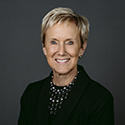
Boards play a vital role in protecting the autonomy of the higher education institutions they oversee and proactively navigating any challenges to those institutions’ independence. In the second part of this podcast, “Board Independence Under Fire,” AGB Interim President and CEO Ellen Chaffee and AGB Senior Fellows and Senior Consultants Jill Derby and David Maxwell discuss the importance of educating and engaging boards in discussions about how to best meet their responsibilities in performing that role, including safeguarding institutional integrity and academic freedom.
Aired: February 29, 2024
Opinions expressed in AGB podcasts are those of the speakers and not necessarily those of the organizations that employ them or of AGB.
Click to Read the Podcast Transcript
Welcome to the Trusteeship Podcast from AGB, the Association of Governing Boards. We cover everything higher education leaders need to know about the challenges facing our nation’s colleges and universities. More important, we provide the facts and insight you need to solve those challenges and to be the storytellers and advocates higher education needs. Boards play a critical role in protecting the autonomy of higher education institutions and must lead proactively to navigate challenges to independence. In part two of this podcast, Board Independence Under Fire, AGB Interim President and CEO Ellen Chaffee and AGB Senior Fellows and Senior Consultants Jill Derby and David Maxwell discuss the importance of education and dialogue within boards to understand their responsibilities, including safeguarding institutional integrity and academic freedom. Ellen, how can boards act with courage in the face of increasing political and ideological pressures?
Ellen Chaffee:
Boards need to understand their authority and they need to uphold their authority and not cede it to anyone else by silence or by diversion of fiduciary duty. And that’s where the whole courage piece comes in. What kind of country is this, what kind of democracy is this if it takes courage to give your opinion about something?
Jill Derby:
In terms of the courage, that’s where I think it’s important that boards spend a lot of time talking about this issue and thinking about how to respond because it’s a balancing act between listening to all appropriate constituencies and trying not to alienate. And so it’s through education and educating the public and speaking up so that there’s a wider understanding of why protecting the independence and autonomy of our colleges and universities is critical to the country. It’s critical to the students that are served. It’s critical to the country, to any discourse in a civil democracy. Making those larger points and connections so that people get what’s at stake, that board members get here’s what really is at stake in these confrontations, in these intrusions that are happening just more and more frequently.
Ellen Chaffee:
And that is particularly difficult in public institutions with sunshine laws. Board agendas need to allocate the time for these kinds of discussions. The day of transactional board agendas is gone. They need to minimize their pro forma decisions and maximize their time to talk about all of these issues.
Jill Derby:
And this is where courageous leadership comes into play. It’s not easy, but it’s really the boards have the authority and they alone can push back and have to find ways to do that.
Ellen Chaffee:
David, what if there’s a board member who is at odds with other board members as far as what is in the best interests of the institution? What can boards do about board members who are seeking to influence in ways that are not helpful for the institution?
David Maxwell:
Thanks. There’s a very easy answer that is very hard to implement, and that is it’s really the responsibility of the board chair, and in some cases, shared with members of the executive committee when appropriate. And the board really needs to protect the president from this, obviously. When board members are violating the standards of board behavior in any way, it really is the responsibility of the chair to address it. And I have had that experience, fortunately not in my own where I was president or on the board, but in the consulting practice, seeing where and counseling boards on how to deal with this. But it is, as I said, it’s very easy to articulate. And needless to say, it’s a very, in many cases, can be a very uncomfortable thing to deal with, but it is the responsibility of the board leadership to deal with it.
Jill Derby:
Let me just add to that that the relationship between the board chair and the president can be very critical here in terms of the sense of partnership that the board chair can work with the whole board to see what’s at stake in the larger community. There may be ways that boards can prepare and structure responses that can be built into a system of trustee expectations. Both public and private have governance committees, certainly AGB recommends a governance committee. And there could be language put into a governance committee that provides some reference when it comes to particular board behavior. But clearly, David is right. It’s the board chair. The board chair has to really nurture and develop good relationships across the board and a strong relationship with the president because it’s only boards that can police themselves, and they have to find ways to do that. And there are some boards that have put certain structures in place that can address that kind of problem. And that’s something that, I think, to be recommended.
It really gets down to board education. And so often, board education is neglected. When new trustees come on, nearly every board has some orientation procedure, but often it’s totally inadequate. And it may be focused on familiarizing the new trustee with the institution, whether it’s a system or a single institution, or even a foundation, whatever it is. That tends to be the focus more than the whole concept of what the role entails, the idea of being a fiduciary. And these larger issues of the position of universities and colleges at the heart of a democracy, and why academic freedom matters. And educating trustees about really their sacred duty when it comes to what universities and colleges are all about, what their educational mission entails broadly and why it is central to a healthy democracy, I think those concepts need to be stressed.
And let me say not only in one session of orientation, orientation as AGB advises is best implemented over a period of time because a newly inducted trustee finds themselves in a new world that they don’t understand what the norms are. There are different norms. That takes some time. And not addressing just the specifics, but really what’s at stake in the role they’ve taken on, what it means really to be a fiduciary of an institution that is so central to not only their communities in the state, but the United States and the democracy itself. And let me say add to that beyond an orientation program that is inclusive of the central concepts of higher education and extends over a period of time, but ongoing board education. Because I think board members can easily come on board and not understand, or could easily think, “Well, the governor wants me to do this, so I’m acting as his agent. Of course I’ll do this.” Or the legislature and so on and so forth, and not understanding the distinction.
So using examples, really making clear what’s at stake. I don’t think we’ve done an effective job of that. I think it’s easy for trustees who want to bring their understanding of management that they bring from whatever professional role they come from and not understand higher education is a different world now. And really to communicate in many different ways using examples and over time with regular educational sessions of boards that focus on this issue in order to educate trustees ongoingly. They’re the guardians. And I think stressing that term of guardians, it’s not a new concept in higher education, it goes way back, but trustees are really the guardians at the gate. And to make that clear and really profoundly communicate that, I think, is one of the most important things that needs to happen through board education.
Ellen Chaffee:
David, you might want to expand on that.
David Maxwell:
Certainly within the context of board orientation and education, as Jill was saying, does the board collectively and individually understand their role and responsibility in protecting the institution from inappropriate influence? Which also then means, I think, getting pretty specific. Can you clarify? When we’re saying inappropriate influence, what are we talking about? What are the criteria that we apply to decide whether somebody’s input is appropriate or inappropriate? What are the questions we should be asking? Or is this consistent with the institutional mission?
Is this in the interest of the institution or is it in the interest of the person making the request or the demand? Does it interfere with institutional autonomy? Does it usurp the authority and responsibility of the institutional stakeholders, the board, the president, and the faculty? I’ve had a mantra for a long time, a crisis is a terrible time to figure out what you’re going to do about it. Having the board working with the institutional leadership to develop scenarios. If there is an attempted undo or inappropriate influence, what are we going to do about it and who’s going to do it? So that you’re having those conversations in advance and not scrambling, if something like that happens, not scrambling in the moment, to figure out how are you’re going to manage it?
Jill Derby:
I think that’s excellent, David. One of the things that can be hard on boards is an incident happens. And we’ve seen that recently in what we saw with the congressional call to resignation of university presidents. It’s an immediate crisis. And if a board hasn’t had some previous conversation around that sort of scenario, they can be caught short. And different members of the board might speak out in different ways. But I think that’s why I would combine that in educationist scenario planning. Boards need to understand specifically what they need to respond to, and how is the best way to respond to that?
Ellen Chaffee:
Absolutely. Another element is that boards are responsible for two organizations. They’re responsible for the institution they govern and they’re responsible for the board itself. They need to take time to make sure the board is in fine-tuned, highly effective, running condition, and that takes time. They need to spend time talking about these very issues and how they are impacted, how their institution is impacted. The other very simple piece that I keep in mind as a board member is focusing on two things. I’m here to make sure the mission is being advanced and fulfilled as effectively as possible, and I’m here to take care of the future. I’m a mission advocate who’s thinking about the long-term sustainability and impact of the institution. And when you’re not in the moment all the time, you can get some perspective on what’s being asked of you by someone. So for example, the loss of a $50 million donation is serious, but when you have billions in your endowment, you need to make decisions based on principle and based on duty. And that does take courage in increasing number of cases.
Jill Derby:
Ellen, let me add to that focus on mission. I think there again, board education, it’s easy, I think, for a new trustee coming on or a sitting trustee to think, “Mission means the program.” And I don’t think trustees, particularly when they’re new to a board, understand exclusively about what mission includes in terms of helping students understand the important role they play in a democracy and how to participate in a learning environment with diverse thought so that they’re prepared to do that in an effective and a responsible way. So when we say mission, I think we at AGB know what we’re talking about. We’re talking about both those elements, the entire mission, the educational mission, which is very inclusive of those key concepts that we need to always protect our academic freedom and our campus environment so that it provides the learning environment that students need to be active and effective citizens in a democracy.
Ellen Chaffee:
David, do you have any closing thoughts?
David Maxwell:
I do. Just thinking about, so what are the next steps? And I think that we’re hoping that trustees accept the responsibility at this point, given this terrifying assault on higher ed. And you may remember that a member of Congress in talking about Harvard and Penn said, “We’re just getting started.” It’s out there. And I’m hoping that trustees will step up to not only assume responsibility for the integrity of their own institution, but to recognize that they have an important voice in the public discourse. That trustees, by definition, tend to have stature in their professions and in their communities, that they have voices that people listen to. We’ve had quite a toxic public discourse for quite some time, even before this latest. I’ve been saying for a number of years that we live in an age in which assertion and belief seem to have the same currency as knowledge and fact, and in which a lot of people believe that if you disagree with me, you’re an idiot and a spawn of the devil by virtue of that fact.
We’ve got a lot to overcome. And I think for trustees to be willing to step up, to have voices in the public discourse, in the media, that helps reverse this increasingly damaging perspective on higher ed. And as you know, that was the fundamental premise behind the Guardians Project that AGB initiated a number of years ago in providing a group of white papers to give trustees the knowledge that they needed to participate in the public discourse. I would like to close just by reemphasizing that I think in this current environment that trustees, I would hope, would accept not only the responsibility for the health and vitality and integrity of their own institution, but to step up as voices protecting the importance of the integrity of the independence and autonomy of institutions and academic freedom in the public discourse.
Jill Derby:
And Ellen, let me add a closing thought as well. I want to close by referring to the AGB Board of Directors’ statement on influences impacting governing board independence and leadership, and say that, at the end of that document, there are a series of recommendations to boards that I think contain the best wisdom that we have to offer. And I think we need to find ways to make that more and more available and bring that to the attention of boards. It could be an instrument that they can use in board education sessions. But the recommendations at the end of it are excellent and specific about ways that boards can respond to the current environment and the risk that we’re facing in terms of the political and ideological intrusion that’s happening into higher education.
Ellen Chaffee:
Thank you both for this very important discussion and highlighting the AGB Board statement on influence impacting board independence and leadership. We at AGB are keenly aware of the need for board members to become more involved and more educated along these lines. We stand prepared to support any member board’s efforts to bring these issues home and support the board’s very challenging times of dealing with the issues in real life. Thank you again for listening. Thank you, Jill and David. Board education, key to everything.
Closing:
Ellen, Jill, and David, thank you so much for joining us and for sharing your insights. For more information on board independence, please visit the knowledge center at AGB.org. Thank you.
Speakers

Ellen Chaffee, PhD
Interim President and CEO, AGB
Ellen Chaffee’s distinguished career spans institutional, system, policy, and national professional leadership in both public and private higher education. As a past president of two universities and two national professional associations, she has led executive, academic affairs, student affairs, research, and equal-opportunity areas. She has also served on and consulted with numerous governing boards as well as advised foundations and nonprofit national organizations in the fields of higher education research, health care, and allied health. In addition, she has conducted extensive research and written numerous publications on management, decision-making, and other topics in higher education.

Jill Derby, PhD
Senior Fellow and Senior Consultant, AGB
Jill Derby has more than 30 years’ experience working nationally and internationally in higher education governance. She is the former board chair of the Nevada System of Higher Education, an eight-institution state system, and now serves as board chair of the American University of Iraq, Sulaimani in Kurdistan.

David Maxwell, PhD
Senior Fellow and Senior Consultant, AGB
David Maxwell is a former chair and current member of the board of Grinnell College. He served as president of Drake University from 1999 to 2015, and upon his retirement, the Drake Board of Trustees awarded him the title of President Emeritus. Previously, he was director of the National Foreign Language Center in Washington, D.C., and president of Whitman College.
RELATED RESOURCES

Trusteeship Magazine Article
United We Stand: An Urgent Call for Leadership

Trusteeship Magazine Article
Send in the Guardians

